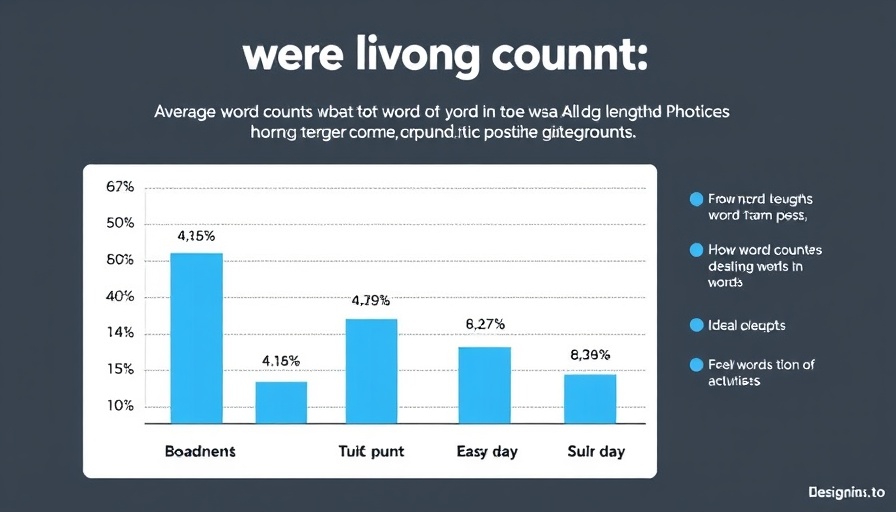
Unlocking the Perfect Blog Post Length: What Works Best?
When it comes to blogging, one question looms large: how long should a blog post be? The answer is as varied as the blogs themselves, swinging between 1,500 to 2,500 words for optimal engagement and performance. As we dive into this topic, let’s clarify why the length matters and what the statistics reveal about reader preferences and SEO performance.
Diving into Data: Blogging Length Insights
The consensus from recent studies paints a clear picture. Semrush's 2023 content marketing report found that high-performing websites boast an average blog post length of 1,152 words. Medium and low-performing sites, on the other hand, typically hover around 902 and 668 words, respectively. But don’t be fooled by shorter posts; evidence shows that longer articles often garner more social media attention too!
For instance, according to QuickSprout’s analysis of Crazy Egg’s blog, articles surpassing 1,500 words attracted 68.1% more tweets and 22.6% more likes on Facebook. So, the takeaway is, while brevity is the soul of wit, longer posts often drive higher engagement.
Learning from Blogging Trends
OrbitMedia’s annual blogging survey for 2024 indicates that the average blog post tallying in the neighborhood of 1,394 words marks a continuous upward trend (a whopping increase from 808 words in 2014!). It’s fascinating to see how behaviors evolve—63% of bloggers still stick to that 500 to 1,500 word sweet spot, but 37% aren’t afraid to push the boundaries further.
Interestingly, 31% of those publishing extensively (3,000+ words) noted strong results from their content. Compare that to the paltry 12% feeling satisfied in the 500-1,000 word range. So what does this mean? If you’re looking to rank and resonate with your audience, diving deep is often the route to success.
Don’t Forget: Length Isn’t Everything!
It’s crucial to note that blog post length alone doesn't assure a spot at the top of Google rankings. For example, consider these three articles ranking for “what is a motherboard”: TechTarget’s concise 635 words, Spiceworks’ hefty 3,301 words, and a middle-ground 1,012 from Lenovo. Clearly, other factors—like domain authority—play a much larger role in rankings.
SEO pros often recommend longer content to display expertise, especially for smaller and medium-sized blogs needing to build authority. But remember, ensuring that your articles are valuable and aligned with search intent is far more critical than simply padding your word count.
Practical Insights: Crafting Your Next Blog Post
Now that we’ve thoroughly explored the ‘how long’ aspect, let’s focus on practical steps for your next blog post:
- Figure Out Your Target Audience: Knowing who you’re writing for dictates how much detail to provide. Zoning in on your audience allows you to scale your tone and complexity to meet their needs.
- Create Valuable Content: Regardless of length, your content should educate or entertain. Ask yourself: does this post provide clear answers or insights?
- Use Targeted Keywords: Working in relevant keywords boosts your chances of showing up on search engines, so incorporate them naturally into your content.
Blogging for Profit: How Length Can Affect Income
If you’re pursuing blogging for income, the discussion about post length ties directly into your monetization goals. Longer, more comprehensive posts can build trust and authority, opening the door for affiliate marketing opportunities, ads, or even selling your own products.
First, identify your niche. Are you creating content aimed at affiliate marketers? Consider including in-depth guides, reviews, and how-tos that entice and inform your readers. The magic number hovers between 1,500 to 2,500 words, coupled with solid promotion tactics, to generate those sweet revenue streams.
Decisions You Can Make With This Information
Across the blogging universe, knowledge is power! With the insights gathered about optimal blog post length, you can tailor your writing process, improve engagement, and ultimately, bolster your profit margin. Use this data to refine your strategy—experiment with different lengths, track engagement metrics, and adjust as necessary.
In the end, while blog length is an important consideration, ensuring your posts deliver genuine value will keep readers coming back! And as my Uncle Bob always says, “A short blog post is like a bad haircut—nobody wants to talk about it!”
 Add Row
Add Row  Add
Add 




 Add Row
Add Row  Add
Add 

Write A Comment